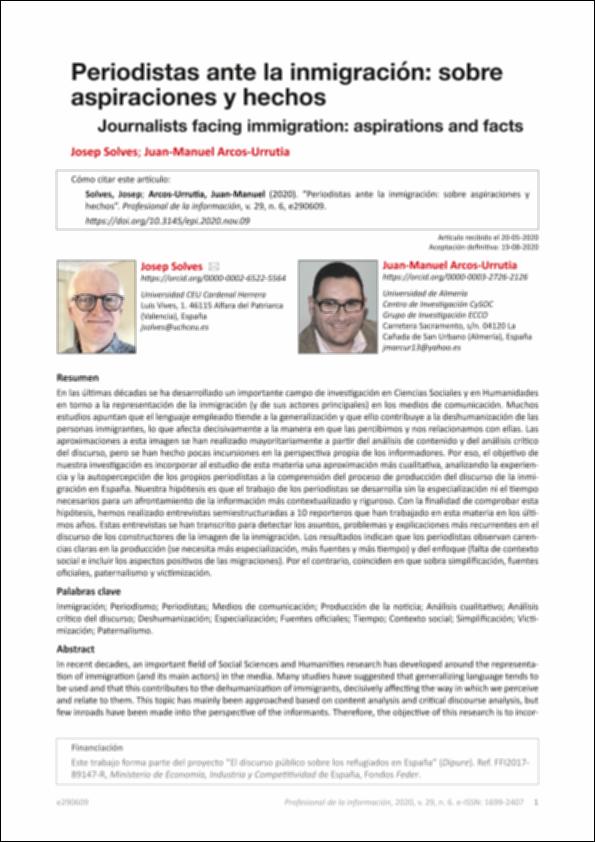Please use this identifier to cite or link to this item:
http://hdl.handle.net/10637/12452Periodistas ante la inmigración : sobre aspiraciones y hechos
| Title: | Periodistas ante la inmigración : sobre aspiraciones y hechos |
| Other Titles: | Journalists facing immigration : aspirations and facts |
| Authors : | Solves Almela, Josep Antoni Arcos Urrutia, Juan Manuel |
| Keywords: | Medios de comunicación - Lenguaje - España.; Mass media and language - Spain.; Periodistas - España.; Journalists - Spain.; Specialized journalism - Spain.; Social classes in mass media - Spain.; Inmigrantes - España.; Immigrants - Spain.; Periodismo especializado - España.; Clases sociales en los medios de comunicación - España. |
| Publisher: | EPI - El Profesional de la Información. |
| Citation: | Solves, J. & Arcos-Urrutia, J.M. (2020). Periodistas ante la inmigración: sobre aspiraciones y hechos. El Profesional de la Información, vol. 29, n. 6 (nov.-dic.), art. e290609. DOI: https://doi.org/10.3145/epi.2020.nov.09 |
| Abstract: | En las últimas décadas se ha desarrollado un importante campo de investigación en Ciencias Sociales y en Humanidades en torno a la representación de la inmigración (y de sus actores principales) en los medios de comunicación. Muchos estudios apuntan que el lenguaje empleado tiende a la generalización y que ello contribuye a la deshumanización de las personas inmigrantes, lo que afecta decisivamente a la manera en que las percibimos y nos relacionamos con ellas. Las aproximaciones a esta imagen se han realizado mayoritariamente a partir del análisis de contenido y del análisis crítico del discurso, pero se han hecho pocas incursiones en la perspectiva propia de los informadores. Por eso, el objetivo de nuestra investigación es incorporar al estudio de esta materia una aproximación más cualitativa, analizando la experiencia y la autopercepción de los propios periodistas a la comprensión del proceso de producción del discurso de la inmigración en España. Nuestra hipótesis es que el trabajo de los periodistas se desarrolla sin la especialización ni el tiempo necesarios para un afrontamiento de la información más contextualizado y riguroso. Con la finalidad de comprobar esta hipótesis, hemos realizado entrevistas semiestructuradas a 10 reporteros que han trabajado en esta materia en los últimos años. Estas entrevistas se han transcrito para detectar los asuntos, problemas y explicaciones más recurrentes en el discurso de los constructores de la imagen de la inmigración. Los resultados indican que los periodistas observan carencias claras en la producción (se necesita más especialización, más fuentes y más tiempo) y del enfoque (falta de contexto social e incluir los aspectos positivos de las migraciones). Por el contrario, coinciden en que sobra simplificación, fuentes oficiales, paternalismo y victimización. / In recent decades, an important field of Social Sciences and Humanities research has developed around the representation of immigration (and its main actors) in the media. Many studies have suggested that generalizing language tends to be used and that this contributes to the dehumanization of immigrants, decisively affecting the way in which we perceive and relate to them. This topic has mainly been approached based on content analysis and critical discourse analysis, but few inroads have been made into the perspective of the informants. Therefore, the objective of this research is to incorporate a more qualitative approach to the study of this topic by analyzing the experience and self-perception of journalists themselves in understanding the process producing the immigration discourse in Spain. Our hypothesis is that the work of journalists is developed without the specialization or time needed for a more contextualized and rigorous treatment of the information. To test this hypothesis, we conducted semistructured interviews with ten reporters who have worked on this subject in recent years. These interviews were transcribed to detect the most recurrent issues, problems, and explanations in the discourse of the constructors of the image of immigration. The results indicate that journalists perceive clear shortcomings in the production (greater specialization, more sources, and more time are needed) and focus (a lack of social context and including the positive aspects of migration). In contrast, they agree that simplification, official sources, paternalism, and victimization are unnecessary. |
| Description: | Este artículo se encuentra disponible en la página web de la revista en la siguiente URL: https://revista.profesionaldelainformacion.com/index.php/EPI/article/view/86196 Este número de la revista El Profesional de la Información lleva por título "Framing (Encuadre)". |
| URI: | http://hdl.handle.net/10637/12452 |
| Rights : | http://creativecommons.org/licenses/by-nc-nd/4.0/deed.es |
| ISSN: | 1386-6710 1699-2407 (Electrónico) |
| Issue Date: | 1-Nov-2020 |
| Center : | Universidad Cardenal Herrera-CEU |
| Appears in Collections: | Dpto. Comunicación e Información Periodística |
Items in DSpace are protected by copyright, with all rights reserved, unless otherwise indicated.


